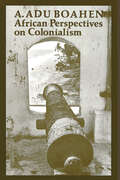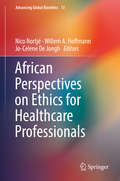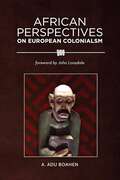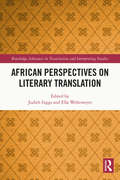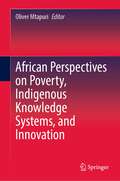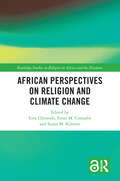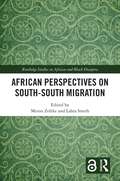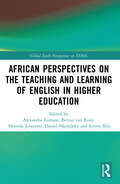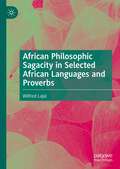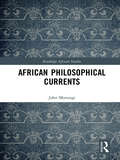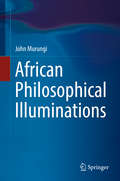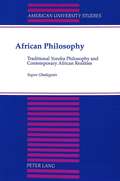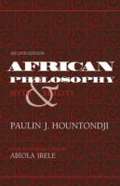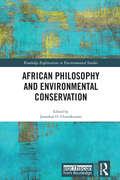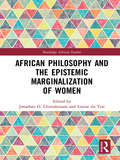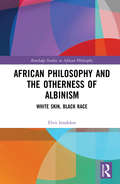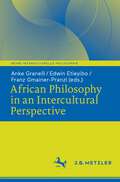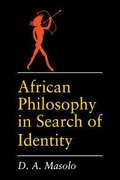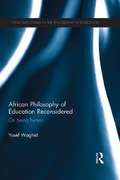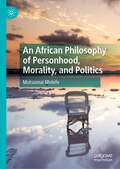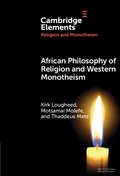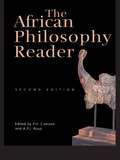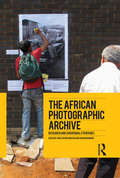- Table View
- List View
African Perspectives on Colonialism (The Johns Hopkins Symposia in Comparative History #15)
by A. Adu BoahenThis history deals with the twenty-year period between 1880 and 1900, when virtually all of Africa was seized and occupied by the Imperial Powers of Europe. Eurocentric points of view have dominated the study of this era, but in this book, one of Africa's leading historians reinterprets the colonial experiences from the perspective of the colonized. The Johns Hopkins Symposia in Comparative History are occasional volumes sponsored by the Department of History at the Johns Hopkins University and the Johns Hopkins University Press comprising original essays by leading scholars in the United States and other countries. Each volume considers, from a comparative perspective, an important topic of current historical interest. The present volume is the fifteenth. Its preparation has been assisted by the James S. Schouler Lecture Fund.
African Perspectives on Ethics for Healthcare Professionals (Advancing Global Bioethics #13)
by Nico Nortjé Jo-Celene De Jongh Willem A. HoffmannThis book focuses on ethical issues faced by a variety of healthcare practitioners across the Anglophone African continent. This important resource contains in-depth discussions of the most salient current ethical issues by experts in various healthcare fields. Each profession is described from both an African and a South African perspective, and thus contributes to dialogue and critical thinking around African ethics and decision-making. In this way the book provides readers with an understanding of the ethical issues at hand in various professions, including the practical implications of the ethical issues and how to address those effectively. This is a beneficial resource for all those involved in the various healthcare professions addressed in this book, including undergraduate students, lecturers, researchers and practitioners across the continent. Simply put, with the dynamic changes and challenges in healthcare across the globe and in Africa, this is an indispensable resource for healthcare practitioners.
African Perspectives on European Colonialism
by John Lonsdale A. Adu BoahenIn this book, one of the pioneers of twentieth century African history examines the perceptions and responses of Africans to European colonialism of the late nineteenth and early twentieth century. This edition of Boahen's text, originally published in 1989, is contextualized in a new foreword by John Lonsdale, updating some of Boahen's findings and interpretations while maintaining that the "best, totally unambiguous, legacy of this republication would surely be the inspiration of a new generation of African scholars, locally based, as clear-minded and outspoken as Adu Boahen himself.
African Perspectives on Literary Translation (Routledge Advances in Translation and Interpreting Studies)
by Judith Inggs Ella WehrmeyerThis collection serves as a showcase for literary translation research with a focus on African perspectives, highlighting theoretical and methodological developments in the discipline while shedding further light on the literary landscape in Africa. The book offers a framework for understanding key approaches and topics in literary translation situated in the African context, covering foundational concepts as well as new directions within the field. The first half of the volume focuses on the translation product, exploring such topics as translation strategies, literary genres, and self-translation, while the second half examines process and reception, allowing for an in-depth look at agency, habitus, and ethics. Each chapter is structured to allow for the introduction of a given theoretical aspect of literary translation followed by a summary of a completed research project with an African focus showing theory in practice, offering a model for readers to build their own literary translation research projects while also underscoring the range of perspectives and unique challenges to literary translation work in Africa. This unique volume is a key resource for students and scholars in translation studies, giving visibility to African perspectives on literary translation while pointing the way forward for future research directions.
African Perspectives on Poverty, Indigenous Knowledge Systems, and Innovation
by Oliver MtapuriThis book examines the connections between poverty and innovation in Africa. Through case studies and theorizations from a distinctly African perspective, it stands in contrast to current theoretical works in the field, which remain very much rooted in Western-orientated thinking. The book investigates the application of methodologies which explain numerous African contexts in connection with issues of poverty and inequality. It reflects on comparative practices and praxes on the African continent, including commonplace traditions and practices in alleviating poverty, taken against a background of the failure of current prescriptions for poverty alleviation, such as the Structural Adjustment Programmes (SAPs) and the Poverty Reduction Strategy Papers (PRSP). There is a dire need for new practical perspectives which move Africa forward using its indigenous knowledge. Owing to a general lack of recorded African theories and methodologies on poverty, inequality and innovation, this book represents a pioneering corpus of African knowledge addressing poverty and inequality through local innovations. Adopting a transdisciplinary approach, it is relevant to students and scholars in development studies and economics, African studies, social studies, political history and political economy, climate studies, anthropology and geography.
African Perspectives on Religion and Climate Change (Routledge Studies on Religion in Africa and the Diaspora)
by Ezra Chitando, Ernst M. Conradie and Susan M. KilonzoThis book interrogates the contributions that religious traditions have made to climate change discussions within Africa, whether positive or negative. Drawing on a range of African contexts and religious traditions, the book provides concrete suggestions on how individuals and communities of faith must act in order to address the challenge of climate change. Despite the fact that Africa has contributed relatively little to historic carbon emissions, the continent will be affected disproportionally by the increasing impact of anthropogenic climate change. Contributors to this book provide a range of rich case studies to investigate how religious traditions such as Christianity, Hinduism, Islam, and indigenous faiths influence the worldviews and actions of their adherents. The chapters also interrogate how the moral authority and leadership provided by religion can be used to respond and adapt to the challenges posed by climate change. Topics covered include risk reduction and resilience, youth movements, indigenous knowledge systems, environmental degradation, gender perspectives, ecological theories, and climate change financing. This book will be of interest to scholars in diverse fields, including religious studies, sociology, political science, climate change and environmental humanities. It may also benefit practitioners involved in solving community challenges related to climate change.
African Perspectives on South–South Migration (Routledge Studies on African and Black Diaspora)
by Lahra SmithThis book investigates the diverse and dynamic forms of migration within Africa. It will be crucial reading for researchers, students, and policy makers with a focus on South-South Migration, Migration and Inequalities, Migration and Development, and Refugee and Humanitarian Studies.
African Perspectives on the Teaching and Learning of English in Higher Education (Global South Perspectives on TESOL)
by Alexandra Esimaje Bertus Van Rooy ‘Demola Jolayemi Daniel Nkemleke Ernest KluThis book brings together the work of African scholars and educators directly involved in initiatives to improve the teaching and learning of English in higher education across Africa. Offering alternative perspectives across different African countries with examples of decolonised practice in research, the book provides a critical discussion and examples of successful practice in the teaching of English in Africa. Each chapter of the book reports on a specific context and a specific teaching and/or learning initiative in higher education, with emphasis on comparability of information and on clear evaluation and critical analysis of the intervention. The editors offer a thoughtful comparison of different methods, strategies and results to provide an authoritative reference to effective strategies for English teaching and learning. The book paints a cohesive picture of the field of English language teaching in Africa and will be of great interest to researchers, scholars and postgraduate students in the areas of applied linguistics, English teaching and comparative education.
African Perspectives on Trade and the WTO
by Patrick Low Chiedu Osakwe Maika OshikawaTwenty-first century Africa is in a process of economic transformation, but challenges remain in areas such as structural reform, governance, commodity pricing and geopolitics. This book looks into key questions facing the continent, such as how Africa can achieve deeper integration into the rules-based multilateral trading system and the global economy. It provides a range of perspectives on the future of the multilateral trading system and Africa's participation in global trade and underlines the supportive roles that can be played by multilateral and regional institutions during such a rapid and uncertain transition. This volume is based on contributions to the Fourth China Round Table on WTO Accessions and the Multilateral Trading System, which took place just before the World Trade Organization's Tenth Ministerial Conference in Nairobi in December 2015.
African Philosophic Sagacity in Selected African Languages and Proverbs
by Wilfred LajulThis book explores African philosophic sagacity, or wisdom philosophy, as proposed by Odera Oruka in his “Four Trends in Current African Philosophy” (1981), which he later expanded to six trends (1998). Oruka defines philosophic sagacity as wisdom philosophy, or philosophy of the wise men of Africa who are independent, liberal and non-conformist thinkers, and who often deviate from the accepted common norms of their societies. This book takes philosophic sagacity discourse beyond Oruka’s definition by encompassing traditional wise sayings and proverbs. It combines individual liberal thinkers and the communal ideas, and cherishes both rational and emotional engagement, offering a broader understanding of African philosophic sagacity. Wilfred Lajul opens the door for new researchers to venture into the study of African languages, wisdom sayings, and proverbs, and helps to unveil the content of this philosophy from the perspective of different African societies.
African Philosophical Currents (Routledge African Studies)
by John MurungiThe history of the human world has reached a stage where no philosophical community can any longer philosophize in isolation from other philosophical communities. The African philosophical community is not an exception and neither is any other philosophical community. There is a widespread notion in the West that philosophy originated in Greece and found its way throughout Europe, from where it migrated to Africa. This book argues that Philosophy did not migrate to African from anywhere but that it is radically native to all communities. The chapters cover the erasure of African philosophy, African philosophical departures, the threat that Christianity has posed to African philosophy, African legal philosophy, African musical aesthetics and connections with classical philosophy. Arguing that the landscape of philosophy has a place not only for Africans but also for all human beings and that African philosophers are among the architects of this landscape, this book is an important read for scholars and students of African philosophy.
African Philosophical Illuminations
by John MurungiThe illumination of African philosophy offered in this volume leads to the illumination of philosophy in general. Illuminating arises as an essential task of philosophy, whether African or not. What is illuminated is not already there, but is constituted at the moment of illumination. This book invites the reader to participate in the illuminating work of philosophy and necessarily, thereby, to contribute to his or her own self-constituting self-illumination. Although the focus is on African philosophy, the book also bridges the gap between African philosophy and other branches. Today more than ever, a bridging philosophy is called for, and this book helps to meet that need. This book poses philosophical questions such as who is an African and what Africa is, and seeks philosophical answers. In doing so, it contributes to the ongoing discourse on African philosophy. It addresses such issues as the African grounding of philosophy, the difference between African and Black philosophy, the African body, African art as expressed in and by Chiwara, the plight of African trees as the plight of Africans, and the symbolic meaning of Robben Island.
African Philosophy: An Anthology
by Emmanuel Chukwudi EzeBringing together canonical philosophical texts from African, African-American, Afro-Caribbean, and Black European thinkers, this major new anthology is designed to serve both as a textbook and as the authoritative reference volume in Africana philosophical and cultural studies.
African Philosophy: Traditional Yoruba Philosophy and Contemporary African Realities
by Segun GbadegesinThe question whether or not there is African philosophy has, for too long, dominated the philosophical scene in Africa, to the neglect of substantive issues generated by the very fact of human existence. This has unfortunately led to an impasse in the development of a distinctive African philosophical tradition. In this path-breaking book, Segun Gbadegesin offers a new and promising approach which recognizes the traditional and contemporary facets of African philosophy by exploring the issues they raise. In Part I, the author examines, with refreshing insights, the philosophical concepts of the person, individuality, community and morality, religiosity and causality, focusing on the Yoruba of Nigeria. Part II discusses, in an original way, contemporary African social, political and economic realities from a philosophical perspective.
African Philosophy: Myth and Reality (Second Edition)
by Paulin J. Hountondji Jonathan Ree Henri EvansThis is a precious gem of a book for anyone who wishes to reflect on civilization and culture. --Choice In this incisive, original exploration of the nature and future of African philosophy, Paulin J. Hountondji attacks a myth popularized by ethnophilosophers such as Placide Tempels and Alexis Kagame that there is an indigenous, collective African philosophy separate and distinct from the Western philosophical tradition. Hountondji contends that ideological manifestations of this view that stress the uniqueness of the African experience are protonationalist reactions against colonialism conducted, paradoxically, in the terms of colonialist discourse. Hountondji argues that a genuine African philosophy must assimilate and transcend the theoretical heritage of Western philosophy and must reflect a rigorous process of independent scientific inquiry. This edition is updated with a new preface in which Hountondji responds to his critics and clarifies misunderstandings about the book's conceptual framework.
African Philosophy and Environmental Conservation (Routledge Explorations in Environmental Studies)
by Jonathan O. ChimakonamAfrican Philosophy and Environmental Conservation is about the unconcern for, and marginalisation of, the environment in African philosophy. The issue of the environment is still very much neglected by governments, corporate bodies, academics and specifically, philosophers in the sub-Saharan Africa. The entrenched traditional world-views which give a place of privilege to one thing over the other, as for example men over women, is the same attitude that privileges humans over the environment. This culturally embedded orientation makes it difficult for stake holders in Africa to identify and confront the modern day challenges posed by the neglect of the environment. In a continent where deep-rooted cultural and religious practices, as well as widespread ignorance, determine human conduct towards the environment, it becomes difficult to curtail much less overcome the threats to our environment. It shows that to a large extent, the African cultural privileging of men over women and of humans over the environment somewhat exacerbates and makes the environmental crisis on the continent intractable. For example, it raises the challenging puzzle as to why women in Africa are the ones to plant the trees and men are the ones to fell them. Contributors address these salient issues from both theoretical and practical perspectives, demonstrating what African philosophy could do to ameliorate the marginalisation which the theme of environment suffers on the continent. Philosophy is supposed to teach us how to lead the good life in all its forms; why is it failing in this duty in Africa specifically where the issue of environment is concerned? This book which trail-blazes the field of African Philosophy and Environmental Ethics will be of great interest to students and scholars of Philosophy, African philosophy, Environmental Ethics and Gender Studies.
African Philosophy and the Epistemic Marginalization of Women (Routledge African Studies)
by Jonathan O. Chimakonam Louise Du ToitThis book examines the underexplored notion of epistemic marginalization of women in the African intellectual place. Women's issues are still very much neglected by governments, corporate bodies and academics in sub-Saharan Africa. The entrenched traditional world-views which privilege men over women make it difficult for the modern day challenges posed by the neglect of the feminine epistemic perspective, to become obvious. Contributors address these issues from both theoretical and practical perspectives, demonstrating what philosophy could do to ameliorate the epistemic marginalization of women, as well as ways in which African philosphy exacerbates this marginalization. Philosophy is supposed to teach us how to lead the good life in all its ramifications; why is it failing in this duty in Africa where the issue of women’s epistemic vision is concerned? The chapters raise feminist agitations to a new level; beginning from the regular campaigns for various women’s rights and reaching a climax in an epistemic struggle in which the knowledge-controlling power to create, acquire, evaluate, regulate and disseminate is proposed as the last frontier of feminism.
African Philosophy and the Otherness of Albinism: White Skin, Black Race (Routledge Studies in African Philosophy)
by Elvis ImafidonAlbinism is one of the foremost disability and public health issues in Africa today. It often makes headlines in local, national and international medias and forms the basis for intense advocacy at all levels. This is primarily due to the harmful representations of persons with albinism deeply entrenched in African traditions. These deeply rooted ideologies about albinism in African thought have largely promoted the continuous discrimination, stigmatization, harming, killing, commodification and violation of the human rights of persons with albinism in African places. How has albinism emerged as a thick concept in African traditions? What are these deeply entrenched ideas about the ontology of albinism in African thought? What epistemic injustice has been done to persons with albinism in Africa places? Why do harmful beliefs about albinism still persist in modern African societies? How does the African communalistic ethic justify the harm done against persons with albinism? What is the duty to, and burden of, care for persons with albinism? What peculiar existential challenges do persons with albinism in general and females with albinism in particular face in African societies and how can they be overcome? What can be learnt from the education philosophy of reconstructionism and genetic engineering in improving the wellbeing of persons with albinism? African Philosophy and the Otherness of Albinism: White Skin, Black Race digs deep into these philosophical questions revealing fascinating but latent aspects of how albinism is understood in African places as a necessary step to take in improving the wellbeing and integrity of persons with albinism in Africa today. This book will be of interest to scholars and students of African philosophy, sociology, African studies and disability studies.
African Philosophy in an Intercultural Perspective (Reihe Interkulturelle Philosophie)
by Anke Graneß Edwin Etieyibo Franz Gmainer-PranzlAfrican philosophy under the specific conditions of a colonial and postcolonial world is – at least since the 20th century if not even earlier – inherently intercultural. The aim and target of the volume is to reveal, interrogate and analyse the intercultural dimension in African philosophy, and to critically interrogate the project of an intercultural philosophy from an African perspective. This volume is the first publication that explicitly discusses African philosophy as a challenge to the project of intercultural philosophy.
African Philosophy in Search of Identity
by D. A. MasoloA Kenyan philosopher surveys themes and debates in African philosophy over the last five decades. Masolo's purview includes Francophone and Anglophone philosophers in both the analytic and phenomenological traditions.
African Philosophy of Education Reconsidered: On being human (New Directions In The Philosophy Of Education Ser.)
by Yusef WaghidMuch of the literature on the African philosophy of education juxtaposes two philosophical strands as mutually exclusive entities; traditional ethnophilosophy on the one hand, and �scientific� African philosophy on the other. While traditional ethnophilosophy is associated with the cultural artefacts, narratives, folklore and music of Africa�s peop
An African Philosophy of Personhood, Morality, and Politics
by Motsamai MolefeThis book explores the salient ethical idea of personhood in African philosophy. It is a philosophical exposition that pursues the ethical and political consequences of the normative idea of personhood as a robust or even foundational ethical category. Personhood refers to the moral achievements of the moral agent usually captured in terms of a virtuous character, which have consequences for both morality and politics. The aim is not to argue for the plausibility of the ethical and political consequences of the idea of personhood. Rather, the book showcases some of the moral-political content and consequences of the account it presents.
African Philosophy of Religion and Western Monotheism (Elements in Religion and Monotheism)
by Kirk Lougheed Motsamai Molefe Thaddeus MetzThe Abrahamic faiths of Christianity, Judaism, and Islam are typically recognized as the world's major monotheistic religions. However, African Traditional Religion is, despite often including lesser spirits and gods, a monotheistic religion with numerous adherents in sub-Saharan Africa; it includes the idea of a single most powerful God responsible for the creation and sustenance of everything else. This Element focuses on drawing attention to this major world religion that has been much neglected by scholars around the globe, particularly those working in the West or Northern Hemisphere. It accomplishes this primarily by bringing it into conversation with topics in the Anglo-American philosophy of religion.
The African Philosophy Reader
by P. H. Coetzee A.P.J. RouxDivided into eight sections, each with introductory essays, the selections offer rich and detailed insights into a diverse multinational philosophical landscape. Revealed in this pathbreaking work is the way in which traditional philosophical issues related to ethics, metaphysics, and epistemology, for instance, take on specific forms in Africa's postcolonial struggles. Much of its moral, political, and social philosophy is concerned with the turbulent processes of embracing modern identities while protecting ancient cultures.
The African Photographic Archive: Research and Curatorial Strategies
by Christopher MortonAfrican photography has emerged as a significant focus of research and scholarship over the last twenty years, the result of a growing interest in postcolonial societies and cultures and a turn towards visual evidence across the humanities and social sciences. At the same time, many rich and fascinating photographic collections have come to light. This volume explores the complex theoretical and practical issues involved in the study of African photographic archives, based on case studies drawn from across the continent dating from the 19th century to the present day. Chapters consider what constitutes an archive, from the familiar mission and state archives to more local, vernacular and personal accumulations of photographs; the importance of a critical and reflexive engagement with photographic collections; and the question of where and what is ‘Africa’, as constructed in the photographic archive. Essential reading for all researchers working with photographic archives, this book consolidates current thinking on the topic and sets the agenda for future research in this field.
